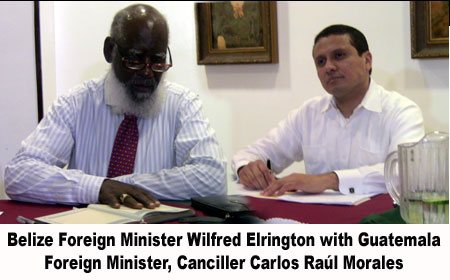BELIZE CITY, Mon. July 27, 2015–Belize Foreign Minister Wilfred “Sedi” Elrington told the media at a press briefing held at the Radisson Fort George Hotel this morning that it was the distrust that Belizeans had decades ago for politicians involved in the Belize-Guatemala process which triggered a demand—now a legal requirement—for a referendum to be held before any move is made to reach a settlement with Guatemala with respect to their unfounded territorial claim over at least half, but as much as all, of what constitutes modern-day Belize.
Evidently, that suspicion of Government officials has gone nowhere; and neither has the requirement for a national referendum—despite the fact that diplomatic officials from both Belize and Guatemala tout the same mantra: that the matter will be resolved at the International Court of Justice (ICJ).
Both Foreign Ministers, in one breath, chanted their official line—that the Belize-Guatemala differendum WILL be settled at the ICJ; but in another breath, they spoke of plans to hold national referenda in the respective countries to allow their electorates to say whether they want the ICJ to adjudicate on the matter.
“We need to go as soon as possible to the ICJ,” said Canciller Carlos Raúl Morales, Guatemala’s Foreign Minister.
“The official position of both countries is that they want to go to the ICJ, but both understand that we don’t speak as a government; we speak with the authority of our people…” Elrington told the press.
He added that while the officials are advocating that position, they accept that only the people can give them the authority to do that.
To some observers on the outside, it appears duplicitous that officials can speak so matter-of-factly about the matter being settled at the ICJ, even before their electorates have had their say on the matter.
Of note is that the initial referendum process was envisioned more than a decade ago, but the question was not whether we would go to the ICJ; it was a question of whether the electorates would accept the Ramphal/Reichler Proposals, which came out of the OAS-led negotiations that culminated in September 2002.
In the end, Guatemala rejected those proposals; triggering a new wave of talks bridged by a series of confidence building measures (2003 and 2005).
Next came the special agreement to have the matter heard at the International Court of Justice (2008). Under this ICJ agreement, the referenda were initially set for October 6, 2013 – but again, Guatemala backed out while putting the blame at Belize’s feet, as it claimed that Belize’s referendum law, which sets a voter turnout threshold to make the referendum valid, would not secure a “yes” vote.
Furthermore, in May this year, Guatemala got Belize to sign a protocol to amend the 2008 special agreement for the ICJ, on the claim that the country wants to hold its referendum during the second round of its presidential elections, slated for October 2015.
However, Canciller Morales confirmed this morning that this will not be possible, since Congress has not met its 3-month deadline of July 25 for approving the protocol and for putting the referendum question on the ballot.
He claims, though, that impending legislative amendments may trigger another set of elections in 2016, providing another opportunity for Guatemala to proceed with the ICJ referendum.
Elrington claimed that all OAS member countries support the resolution of the differendum at the ICJ.
He said that the British had originally insisted that the matter should be settled by adjudication—not negotiation—but it was local politicians who agreed to try the process of negotiation.
He said that while Guatemala had repudiated the 1859 Boundary Treaty, which defines the borders of Belize, the British have insisted that the treaty stands.
“The British have always said, ‘It is good.’ When the ICJ tells us that is bad, then we will subscribe to that too; but until then, we regard this as, in fact, the territory of British Honduras, being that which is articulated by the 1859 treaty,” Elrington said.
Elrington claimed that whereas Guatemala had previously threatened military invasion of Belize, there has been “peace and harmony” since the days of Independence.
“We have a harmonious relationship that really is the envy of the world…” Elrington said, in claiming that the law enforcement authorities of Belize and Guatemala work side by side.
According to Moralez, Belize and Guatemala had agreed to separate the bilateral agenda, under which Belize has continued to embrace trade with Guatemala, from the ICJ referendum issue.
“The ICJ will decide the differendum, but today the most important thing is to be friends… to build peace in both countries and to avoid fighting between the countries,” Moralez said.
Elrington also pointed to a set of 13 bilateral agreements which Belize and Guatemala signed last year, many of which were found to have been cited in the 2005 confidence-building measures. He called the signing of the 13 agreements “unprecedented in the history of Belize and Guatemala.”
Towards the close of today’s press briefing, our colleague, Marisol Amaya, KREM News Director, raised questions about Guatemala’s position on the ownership of Sarstoon Island; the unpaid compensation of $46,000 for the recent grounding of a Guatemalan gunboat on Belize’s reef; as well as on whether the killer or killers of Special Constable Danny Conorquie, believed to be of Guatemalan nationality, will be brought to justice. However, her queries were not answered, as officials, who said they were pressed for time, dashed off to a meeting with the Group of Friends, the 20 countries which have been supporting the peace process between Belize and Guatemala.
Moralez, in closing the press briefing, said that Belize and Guatemala are not going to solve their problems today.
“That is why we are going to the ICJ,” he maintained.

